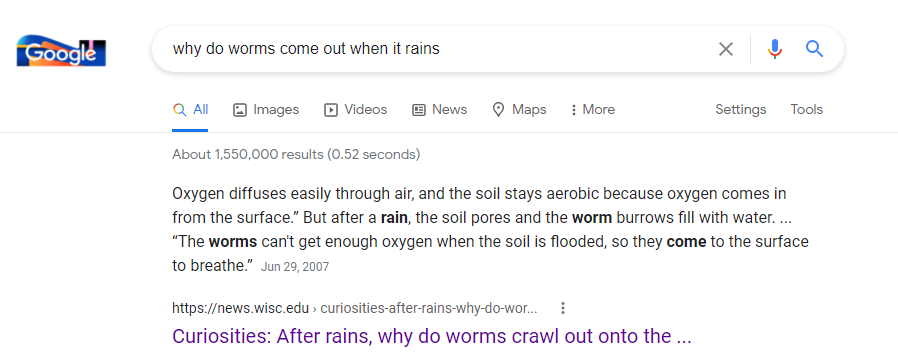Why Do Worms Come Out When it Rains?
The Now I Know Weekender, April 23, 2021
Hi!
This Friday, I want to spend a few minutes sharing a story I decided not to write.
Over the last two weeks, we’ve gotten a lot of rain where I live, as the saying goes. And every time, within hours, my driveway has been covered in worms. The question prompted by a curious elementary schooler who shares that driveway:
Why do worms come out when it rains?
That sounds like a great topic for Now I Know, so I got to researching. And what I found was a great explanation! But what I really learned was something more important:
Google was wrong.
Really! Here’s what came up when I popped the question above into Google.

It’s a great search result, right? It’s totally on point. It uses sciency words like “diffuses” and “aerobic.” It has a straightforward conclusion: “The worms can’t get enough oxygen when the soil is flooded, so they come to the surface to breathe.” And the source seems immediately reputable — it’s from a major American university! And… it’s wrong.
Well, not wrong. Just out of date. The article itself, available here, is from June of 2007 (which, in fairness to Google, the search engine makes clear in the blurb). The article cites a professor who shares the common theory at the time: the worms evacuate their in-ground homes because the ground floods, forcing out all the air. Basically, in non-rainy conditions, the soil has gaps that are filled with air and/or water, and the worms “breathe” the air through their skin. But when it rains, the rainwater fills those gaps, forcing the air out, leaving the worms with nothing to breathe. They leave the soil to avoid drowning.
Makes sense, super interesting, and fourteen years later, probably wrong. Here’s what Scientific American reported in 2011:
For years scientists seemed to think the only reason earthworms came to the soil surface after a good rain was to prevent drowning in their water-filled burrows.
“This is not true as earthworms breathe through their skins and actually require moisture in the soil to do so,” said Dr. Chris Lowe, Lecturer in Waste and Environmental Management, University of Central Lancashire in Preston, United Kingdom.
Earthworms are unable to drown like a human would, and they can even survive several days fully submerged in water.
Oh.
Scientific American goes on to say that the worms may be doing this for “migration purposes” — basically, the wet conditions make it relatively easy for them to move long distances above-ground. But most others discount that as a “reason” for the behavior — while it makes sense that worms can migrate better when the ground is wet, it’s unclear (at best) why they’d need to migrate in the first place. One theory: rain causes vibrations below-ground, and the worms are mistaking those vibrations for moles and other predators. But as the Nature Conservatory notes, “this theory has never been demonstrated in laboratory tests” and, besides, “after a rainstorm, not all of the worms of a given species come to the surface,” and notably, the younger worms are staying behind underground. Baby worms hanging out below ground to be eaten by a mole? That seems like a really bad way to perpetuate a species.
The conclusion: we’re not really sure what’s going on here. On the other hand, the worm-eating birds don’t mind. And for us non-birds, this story is a good reminder to not trust the first source you read — pardon the pun, but we should all dig a little deeper.
The Now I Know Week in Review
Monday: Water Safety That Uses Your Mussels. Speaking of trusting one’s sources, a few sources I used for this conflated “clams” and “mussels,” which, until I looked into it in writing this, I would have also conflated as the same.
Tuesday: When Baseball Went to Pot. The reddit /r/baseball community talked about this a bit and wondered why I used a picture of Citi Field, where the Mets play, instead of a picture of the Big A, where the event actually took place. The answer: I’m a Mets fan and I like to make Mets references.
Wednesday: Why You Shouldn’t March Over a Bridge in Lockstep: A disaster from nearly two centuries ago.
Thursday: The Road Repair That Broke Science. As a few of you commented, “wait, a city actually repaired a broken curb?”
And some other things you should check out:
Some long reads for the weekend.
1) “I’m a Journalist. Apparently, I’m Also One of America’s ‘Top Doctors.‘” (ProPublica, 8 minutes, February 2019). The title of the piece doesn’t make it 100% clear, but the journalist is NOT a doctor.
2) “Over 3 Million People Took This Course on Happiness. Here’s What Some Learned.” (New York Times, 7 minutes, March 2021). Yes, this is behind a (weak, easy-to-avoid) paywall. But it’s a worthy read if you can get to it.
3) “The True Story Of The Fake Zombies, The Strangest Con In Rock History” (Buzzfeed, 16 minutes, June 2016). The subhead: “In 1969, the Zombies had a huge hit single, despite having broken up two years earlier. To meet the unexpected demand, one promoter did the only sensible thing: Hire four kids from Texas to tour America pretending to be a defunct British psych-rock band.”
Also, a story that would have made for a good Now I Know, but I try not to write about Big Bird and his friends: “Sesame Street costume found: ‘Big Bird Bandits’ dump costume, apologise for theft with note in beak.” Thanks to John G. for sharing.
Have a great weekend!
Dan
